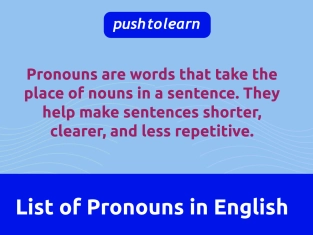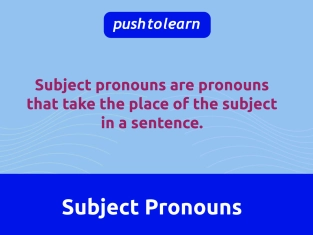by PushtoLearn
Pronombres Indefinidos
Tabla de contenidos
- Ejercicios de Pronombres Indefinidos
- ¿Qué son los Pronombres Indefinidos?
- Uso de Verbos en Singular y Plural con Pronombres Indefinidos
- Referirse a un Pronombre Indefinido en la Oración
- Uso de Pronombres Indefinidos en Oraciones Negativas
- Posesivos con Pronombres Indefinidos
- Uso de "Else" con Pronombres Indefinidos
- Errores Comunes con Pronombres Indefinidos
- Ejemplos en Conversaciones Cotidianas
- Preguntas Frecuentes sobre Pronombres Indefinidos
Ejercicios de Pronombres Indefinidos
Estos ejercicios se enfocan en los pronombres indefinidos.
¿Qué son los Pronombres Indefinidos?
Aquí hay algunos pronombres indefinidos comunes:
|
Para Personas |
Para Cosas |
|
anybody |
anything |
|
everyone |
everything |
|
nobody |
nothing |
|
somebody |
something |
|
anyone |
anything |
|
no one |
nothing |
|
someone |
something |
Regla Clave: "-body" / "-one" para Personas, "-thing" para Cosas
Everybody enjoyed the concert. ✅ (Se refiere a personas)
Everything was perfect at the party. ✅ (Se refiere a cosas)

Uso de Verbos en Singular y Plural con Pronombres Indefinidos
Los pronombres indefinidos siempre llevan un verbo en singular:
|
Pronombre Indefinido |
Forma Correcta del Verbo |
|
Everybody loves chocolate. ✅ |
(NO Everybody love chocolate ❌) |
|
Something is wrong. ✅ |
(NO Something are wrong ❌) |
Referirse a un Pronombre Indefinido en la Oración
Cuando se hace referencia a un pronombre indefinido, se usa un pronombre plural (they, them, their):
|
Oración con Pronombre Indefinido |
Referencia con "They" |
|
Somebody left their bag. |
They must have forgotten it. |
|
Everybody enjoyed the concert. |
They stood up and clapped. |
🔹 Ejemplo:
"I will tell somebody that dinner is ready. They have been waiting a long time."
Uso de Pronombres Indefinidos en Oraciones Negativas
🚨 En oraciones negativas, usa palabras con no- en lugar de palabras con any-.
|
Correcto |
Incorrecto |
|
Nobody came. ✅ |
❌ Anybody didn't come. |
|
Nothing happened. ✅ |
❌ Nothing didn't happen. |
🔹 Ejemplo:
✅ No one was at home. (NO Anyone wasn’t at home. ❌)
Posesivos con Pronombres Indefinidos
Se puede agregar 's a un pronombre indefinido para indicar posesión:
|
Oración |
|
Is this anybody’s phone? |
|
They were staying at somebody’s house. |
Uso de "Else" con Pronombres Indefinidos
Usa else para hablar de otras personas o cosas:
|
Oración |
|
All the family came, but no one else. |
|
If Michael can't come, we'll ask somebody else. |
|
This is somebody else's coat. |
Errores Comunes con Pronombres Indefinidos
|
❌ Incorrecto |
✅ Correcto |
Razón |
|
Everyone are here. |
Everyone is here. |
Los pronombres indefinidos llevan verbos en singular. |
|
Nobody didn't come. |
Nobody came. |
No se usan dobles negaciones en inglés. |
|
Someone forgot his bag. |
Someone forgot their bag. |
Usa they/their para evitar sesgo de género. |
Ejemplos en Conversaciones Cotidianas
🔹 Hablando de personas:
✅ Everybody at the party was dancing.
✅ Somebody called, but they didn’t leave a message.
✅ No one knows the answer.
🔹 Hablando de cosas:
✅ I looked in the fridge, but there was nothing to eat.
✅ I want to buy something special for my friend.
Preguntas Frecuentes sobre Pronombres Indefinidos
¿Cuál es la diferencia entre "everyone" y "everybody"?
No hay diferencia en el significado. Everybody es ligeramente más informal que everyone.
¿Debo usar "his" o "their" con pronombres indefinidos?
Usa their porque es neutral en cuanto al género:
✅ Someone forgot their phone. (NO his phone porque no sabemos el género).
¿Puedo usar "else" con todos los pronombres indefinidos?
No, solo con pronombres que se refieren a personas:
✅ Somebody else, anyone else, nobody else
❌ Something else (para objetos, no personas)
¿Los pronombres indefinidos llevan verbos en singular o plural?
Siempre llevan verbos en singular:
✅ Everything is fine.
❌ Everything are fine.
¿Cómo uso pronombres indefinidos en oraciones negativas?
Usa palabras con no- en lugar de any- palabras:
✅ Nobody was there.
❌ Anybody wasn’t there.

